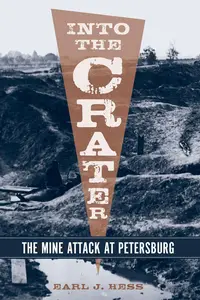
Free Download Into the Crater: The Mine Attack at Petersburg by Earl J. Hess
English | September 1, 2010 | ISBN: 1570039224 | 360 pages | EPUB | 3.67 Mb
A comprehensive examination of the iconic Civil War battle, its tragic outcome, and the personalities involved
The battle of the Crater on July 30, 1864, was the defining event in the 292-day campaign around Petersburg, Virginia, in the Civil War and one of the most famous engagements in American military history. Although the bloody combat of that "horrid pit" has been recently revisited as the centerpiece of the novel and film versions of Charles Frazier's Cold Mountain, the battle has yet to receive a definitive historical study. Distinguished Civil War historian Earl J. Hess fills that gap in the literature of the Civil War with Into the Crater.
The Crater was central in Ulysses S. Grant's third offensive at Petersburg and required digging of a five-hundred-foot mine shaft under enemy lines and detonating of four tons of gunpowder to destroy a Confederate battery emplacement. The resulting infantry attack through the breach in Robert E. Lee's line failed terribly, costing Grant nearly four thousand troops, among them many black soldiers fighting in their first battle. The outnumbered defenders of the breach saved Confederate Petersburg and inspired their comrades with renewed hope in the lengthening campaign to possess this important rail center.
In this narrative account of the Crater and its aftermath, Hess identifies the most reliable evidence to be found in hundreds of published and unpublished eyewitness accounts, official reports, and historic photographs. Archaeological studies and field research on the ground itself, now preserved within the Petersburg National Battlefield, complement the archival and published sources. Hess re-creates the battle in lively prose saturated with the sights and sounds of combat at the Crater in moment-by-moment descriptions that bring modern readers into the chaos of close range combat. Hess discusses field fortifications as well as the leadership of Union generals Grant, George Meade, and Ambrose Burnside, and of Confederate generals Lee, P. G. T. Beauregard, and A. P. Hill. He also chronicles the atrocities committed against captured black soldiers, both in the heat of battle and afterward, and the efforts of some Confederate officers to halt this vicious conduct
Into the Crater The Mine Attack at Petersburg Torrent Download , Into the Crater The Mine Attack at Petersburg Watch Free Link , Into the Crater The Mine Attack at Petersburg Read Free Online , Into the Crater The Mine Attack at Petersburg Download Online
